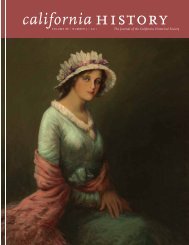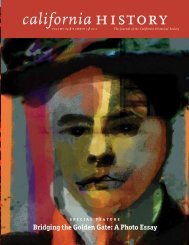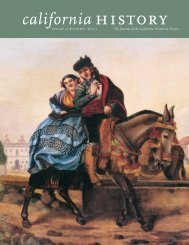In fact, a disciple of Miller’s had calculatedthat the Rapture would take place on October22, 1844, more than a decade before the Severancesrelocated to Boston, a center “famous,” inCaroline’s view, “in the world of letters, moralsand unfettered thought.” Most likely the family’sdeparture in 1855 was prompted by T.C’s businessmisadventures. When the forty-one-year-oldbank employee suddenly found himself withoutemployment, the Severances’ friends in Massachusettshelped him secure a job with a Bostonbank. The proffered position was that of teller, onthe bottom rung of banking’s career ladder. 23It was not the first time that T.C. was required tostart over. During the early 1840s, when Cleveland’sbanks were lost to repercussions of thePanic of 1837, T.C. had helped to build the Fireman’sInsurance Company into a quasi-bankinginstitution, taking advantage of a state law thatgave insurers note-issuing privileges. In 1845,the Ohio legislature passed a new bill placingbanking authority exclusively with chartered stateand independent banks. Fireman’s collapsed, takingcorporate secretary Severance down with it.“T.C. bears up under his losses like a man,” hisbrother John observed to their sister-in-law, MaryLong Severance, “and although he has lost hishouse & nearly every thing if not more—yet he isT.C. all over . . . says if he ‘has got to begin at thebottom and look up again, why very well, I’ve agood head & good pluck’ such a spirit at such atime is worth all the Indians in America.” 24T.C. and his business partners quickly regrouped.With a $50,000 investment from a new partner,they established City Bank, the first independentbank to be chartered in Cleveland under the newstate law. Severance served as the bank’s secretaryand cashier until 1849, when he jumped (orwas pushed) into a cashier’s position with CanalBank, an independent house catering to businessesdependent upon or related to water transportation.T.C. joined Canal Bank the same yearthat the Cleveland, Columbus, and Cincinnatirailroad began operations. As City Bank beganits evolution into Cleveland’s long-lived NationalCity Bank, Severance’s new employer traced adownward spiral. Perhaps Canal Bank’s reducedcircumstances motivated T.C. to take a second jobin 1851, selling the “Phillips’ fire annihilator,” anextinguisher designed for residential use. 25Its clientele diminished by the advent of the railroadera, Canal Bank failed during a depositors’run in 1854. “The bill holders, who got the goldfor their notes, were arrayed in smiles,” observeda reporter from Cleveland’s Plain Dealer whowas on the scene, “and contrasted, most ludicrously,with the grim-visaged depositors, whogot nothing.” Except, that is, for a certain CaptainGrummage. The day before the bank collapsed,Grummage had deposited $1,000 earned from ayear’s work on the Great Lakes. Upon hearing ofthe institution’s apparent insolvency, he grabbeda gun, forced his way into the bank’s offices atSuperior Avenue and Bank (West Sixth) Street,and ordered cashier Severance to return hisdeposit or else. Unprepared to “meet his maker,”T.C. complied. 26The welcome the Severances received in Bostonwas considerably warmer. William Lloyd Garrisoninvited them to a reception to meet his fellowreformers “as soon as Caroline had unpacked.”She needed no second invitation to join theirranks. “My Mother . . . never entered the mostfashionable society in and around Boston,” herson Mark recalled. “The predominant feature ofour domestic life was . . . reform. . . . [W]heneverany matter involving the improvement of the lifeof men or women or children was brought to thefore, my mother at once took part in it.” Carolinebegan speaking in abolition circles, became correspondingsecretary of the Boston Anti-Slavery<strong>Society</strong>, and delivered her “Humanity” lecturethroughout New England. During the Civil War,she served on the Boston board of the U.S. SanitaryCommission, an agency that coordinated thevolunteer efforts of women to support the Union.<strong>California</strong> History • volume 88 number 1 2010
After emancipation, she helped to open the Bostonoffice of the Freedmen’s Bureau, a federalcommission that supported liberated AfricanAmericans in their efforts to establish new lives. 27Having observed through her volunteer work atthe Sanitary Commission the great things thatcould be accomplished when women pulledtogether, Caroline began meeting with prominentfemale Bostonians to discuss a novel idea thatshe had first conceived in Cleveland. She wantedto organize a women’s club, envisioning “a centerof thought and action . . . a larger home forthose who love and labor for the greater humanfamily.” Opposition “from all sides” did not deterher or fellow women’s rights advocates LucyStone and Julia Ward Howe from incorporatingthe New England Women’s Club on March 10,1868. Also in 1868, New York journalist JaneCunningham Croly organized Sorosis, a professionalwomen’s association. 28Launching a club movement that is recognizedtoday as critical to the struggle of women to wintheir civil and political rights, these two organizationsserved as the models for thousands of otherwomen’s groups devoted to civic reform andself-improvement. The New England Women’sClub immediately proved its effectiveness, raisingmonies to support a tuition-free kindergarten forpoor children and the first hospital in Boston runby and for women, providing young women withcollege scholarships, lobbying for the installationof police matrons in women’s jails and asylums,and helping to elect women to Boston’s SchoolCommittee. The latter initiative allowed womento “have a voice and a vote in city governmentbefore they attained state or federal suffrage.”Caroline, who served as president of the organizationfrom 1868 to 1871, when she was succeededby Julia Ward Howe, would go on to win a uniqueplace in <strong>history</strong> as the “mother of clubs.” 29A Last Chance at WealthBy the early 1870s, T.C. was looking for a freshstart. Little more than twenty years earlier, in1850, <strong>California</strong> had entered the Union, andnow T.C. was pining to move to the nation’sthirty-first state.Ever since the discovery in 1848 of shiny bits ofmetal in a millrace in northern <strong>California</strong> hadprompted three hundred thousand people fromaround the world to take leave of their sensesand head straight for the foothills of the SierraNevada to pan for gold, <strong>California</strong> had occupiedan exalted place in the American imagination.Not only was the state part of the country’s lastfrontier, it was reputed to have perfect weather,an astoundingly beautiful topography (whosetreacherousness had yet to be fully appreciated),and an elastic social structure. Young peoplelooking for opportunity and adventure and thosein need of a second chance in life all believedthat they could make good there.The Severances’ <strong>California</strong> dream centered onthe purchase of a ranch in partnership with theirtwo eldest children. Thirty-two-year-old JamesSeymour Severance and his twenty-eight-year-oldbrother, Mark, had preceded their parents to theformer Mexican territory, which had passed intoU.S. hands (along with most of the lands thatbecame the American Southwest) at the end ofthe Mexican-American War in 1848. The youngmen ended up in Santa Barbara, a former Spanishmission town of four or five thousand, wherefamily friends from Cleveland owned a ranch. 30The brothers had assured their parents thatan investment in ranch land would, in time,dramatically increase in value. James Seymourpointed to the example of “young Blossom,” whohad come to southern <strong>California</strong> two monthsafter James’s arrival in 1872. Blossom had purchasedtwo five-acre “blocks” in Santa Barbara,one for $1,500 and the other for $1,000, and soldthe latter parcel for $2,500 within three months.9
- Page 3: california historyvolume 88 number
- Page 6 and 7: c o l l e c t i o n sAdmission tick
- Page 8 and 9: c o l l e c t i o n sBusiness cards
- Page 10 and 11: People’s Park:Birth and SurvivalB
- Page 12 and 13: even on existing dorms due to the h
- Page 14 and 15: The attraction, however, was fleeti
- Page 16 and 17: Bay Area—North Beach and Haight-A
- Page 18 and 19: A hundred students, activists, and
- Page 20 and 21: are building a park on the land. We
- Page 22 and 23: and illegal drug use in the park. T
- Page 24: without even allowing Siegel to con
- Page 27 and 28: As Bloody Thursday came to a close,
- Page 29 and 30: this state.” On June 20, Reagan t
- Page 31 and 32: Denovo, her autopsy revealed a down
- Page 33 and 34: ation and encouragement, and shed n
- Page 35 and 36: the guardians of her children. The
- Page 37 and 38: mitted to visit Caroline in her new
- Page 39: Sojourner Truth gave what famously
- Page 43 and 44: This 1885 view captures the sparsel
- Page 45 and 46: But Caroline thought it imprudent t
- Page 47 and 48: The “Mother of Clubs”In Boston,
- Page 49 and 50: Caroline attended the September 189
- Page 51 and 52: ments, Seymour and Sibley earned pe
- Page 53 and 54: In this photograph, San Francisco s
- Page 55 and 56: n o t e s12People’s Park: Birth a
- Page 57 and 58: 1969; McGill, The Year of the Monke
- Page 59 and 60: that “thousands of the brightest
- Page 61 and 62: For Both Cross andFlag: Catholic Ac
- Page 63 and 64: d o n o r sThe California Historica
- Page 65 and 66: In Kind DonationsSandy Alderson, Sa
- Page 67: Membership BenefitsJoin tHeCaliforn









